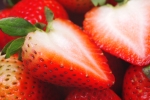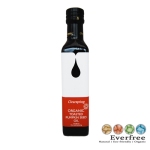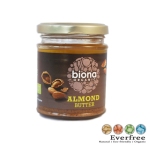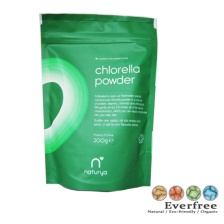Carrying on from Yesterday, Everfree Tuesday will tell you the
benefits of eating strawberries. Did you know? Every day more than 2
tonnes of Strawberries are eaten with between 27 and 34 Tonnes being
eaten over the entire Wimbledon tournament. Wow.
It is shaped like a heart, its smells wonderful and the taste is super delicious.
The strawberry is not just good looking and sweet but it is also very
healthy and potent fruit that has many benefits to our health and that
is why its so popular today.
The Wimbledon tournament can’t go without them and it has become a
tradition to have fresh strawberries served every year to the spectators
that can enjoy both the tennis matches and this exquisite fruit as
refreshment at the same time.
It is rich in vitamins and minerals, carbohydrates, antioxidants and dietary fibres.
The vitamin C is most prevalent of all the vitamins and its very
powerful antioxidant that slows the ageing process of our cells and
protects us from cancer, it keeps the heart strong and lowers the blood
pressure, it cleans the blood vessels from plaque and makes them more
elastic which helps to prevent strokes.
It contains Vitamin B complex (B1, B2, B3, B6, B9) which strengthens the
nervous system and protects from stress and depression, it relieves PMS
symptoms in women and protects the heart from diseases.
It has also vitamin E that promotes healthy eyes and skin, it has very
good effects on the immune system and the antioxidant properties are
protecting our body cells from the free radicals.
It has the vitamin K which is important for the blood quality and
enables wounds to heal more quickly, it has been proven that
Strawberries protect us from certain diseases like Osteoporosis,
Alzheimer’s, and Cancer.
Strawberries contain large quantities of minerals like iron that
prevents Anemia and ensures normal development of the human body.
The calcium in this fruit is an essential mineral for our skeletal system, it prevents colon cancer and reduces obesity.
Magnesium is also present and he provides protection from insomnia,
constipation, kidney stones and keeps the heart, the teeth and the bones
in good shape.
It also has phosphorus which is good for the development and the health
of bones and teeth, it regulates and stabilises the heartbeat and
enables normal work of the kidneys.
Strawberry’s contain potassium which is good for the heart, it
prevents arrhythmia and other harmful heart conditions, it also reduces
the risk of osteoporosis and kidney stones.
It has healthy dosage of manganese that aids in the metabolism and provides normal function of the nervous system.
Zinc is also one of the important minerals that improves the brain
functioning and activity, it helps in healing wounds and ulcers,
provides protection against skin cancer and ensures healthy white blood
cells.
The carbohydrates are boosting our energy levels and the dietary fibres
are helping to have and maintain healthy digestive system.
This fruit is beautiful both outside and inside, it protects us from
various diseases and degenerative processes, people have used it as food
and cure for centuries, it makes us look younger and feel healthier,
and even today nothing can beat a bowl full of fresh, juicy and
delicious strawberries.
If you liked this recipe please follow us on Facebook.com/EverfreeLtd
Or maybe you are on google+ you can plus one us at Plus.Google.com/EverfreeLtd
Check out our Online Natural Health Store at www.everfree.co.uk
Wednesday 3 July 2013
Tuesday 2 July 2013
Natural foods that fight Anaemia
Anaemia occurs when the level of haemoglobin in the blood is below
the bodies requirements; this could be due to the amount of red blood
cells (Pernicious anaemia) in our bodies and possibly their shape
(sickle cell, pernicious). Haemoglobin is the oxygen carrier in our
blood and is essential for getting oxygen to the organs of your body.
Iron is needed to bind oxygen to the haemoglobin in the red blood cells
and a low level of iron is the most common cause of anaemia in the UK. A
woman normally carries enough iron in her system to last 6 months,
however abnormal conditions such as anaemia sees this store severely
reduced.
Another thing to mention at this point is that current research has found that anaemia and the severe reduction of iron stores is linked to neurodegenerative diseases such as Multiple Sclerosis.
Undergoing tests with your doctor will be an essential part of trying to diagnose Coeliac disease which is essentially another form of anaemia as bleeding in the stomach or stomach ulcers, can cause a malabsorption of Vitamin B12 through the destruction of the cells in the stomach lining that produce a protein called Intrinsic Factor, which is essential for the body’s absorption of B12.
About 20% of women, 50% of pregnant women and 3% of men do not have enough iron in their body. The solution, in many cases, is to consume more foods rich in iron.
The following is the detailed list of different foods that can help fight anaemia. You should definitely find something that you like whether you’re vegan or not. We also state the quantities of each food you need to eat to ensure sufficient intake of iron.
There are two forms of dietary iron: haem and non-haem. Haem iron is derived from haemoglobin. It is found in animal foods that originally contained haemoglobin such as red meats, fish and poultry. Your body absorbs the most iron from haem sources.
Very good sources of haem iron, with 3.5mg or more per portion, include:
• 85g (3oz) of beef or chicken liver
• 85g (3oz) of clams or molluscs
• 85g (3oz) of oysters
Good sources of haem iron, with 2.1mg or more per portion, include:
• 85g (3oz) of cooked beef
• 85g (3oz) of canned sardines, canned in oil
• 85g (3oz) of cooked turkey
Other sources of haem iron, with 0.7mg or more per portion, include:
• 85g (3oz) of chicken
• 85g (3oz) of halibut, haddock, perch, salmon or tuna
• 85g (3oz) of ham
• 85g (3oz) of veal
Iron in plant foods such as lentils, beans and spinach is non-haem iron. This is the form of iron added to iron-enriched and iron-fortified foods. Our bodies are less efficient at absorbing non-haem iron, but most dietary iron is non-haem iron.
Very good sources of non-haem iron, with 3.5mg or more per portion, include:
• Breakfast cereals enriched with iron
• 185g (6½oz) cooked beans
• 115g (4oz) of tofu
• 25g (1oz) pumpkin, sesame or squash seeds
Good sources of non-haem iron, with 2.1mg or more per portion, include:
• 85g (3oz) of canned butter beans, red kidney beans, chickpeas or split peas
• 125g (4½oz) dried apricots
• One medium baked potato
• One medium stalk of broccoli
• 55g (2oz) enriched egg noodles
• 4 tablespoons of wheat germ
Other sources of non-haem iron, with 0.7mg or more, include:
• 25g (1oz) peanuts, pecans, walnuts, pistachios, roasted almonds, roasted cashews or sunflower seeds
• 75g (2¾oz) dried seedless raisins, peaches or prunes
• 25g (1oz) spinach
• One medium green pepper
• 55g (2oz) medium-shaped pasta
• One slice of bread, or bran muffin
• 200g (7oz) rice
And finally, super food powders that can be used in salads, mixed with sources and with smoothies or juices to enrich you diet with essential iron:
• 6g Chlorella
• 6g Spirulina
Legal statement:
Always seek the advice of your doctor before beginning any new treatment or if you should have any questions regarding a medical condition. If you’ve been diagnosed with anemia, make sure to have regular blood tests to check on your condition. Your health care provider might want to prescribe additional iron supplements.
You should not disregard medical advice, or delay seeking medical advice, because of something you read in this article or the links accessible through it.
Another thing to mention at this point is that current research has found that anaemia and the severe reduction of iron stores is linked to neurodegenerative diseases such as Multiple Sclerosis.
Undergoing tests with your doctor will be an essential part of trying to diagnose Coeliac disease which is essentially another form of anaemia as bleeding in the stomach or stomach ulcers, can cause a malabsorption of Vitamin B12 through the destruction of the cells in the stomach lining that produce a protein called Intrinsic Factor, which is essential for the body’s absorption of B12.
About 20% of women, 50% of pregnant women and 3% of men do not have enough iron in their body. The solution, in many cases, is to consume more foods rich in iron.
The following is the detailed list of different foods that can help fight anaemia. You should definitely find something that you like whether you’re vegan or not. We also state the quantities of each food you need to eat to ensure sufficient intake of iron.
There are two forms of dietary iron: haem and non-haem. Haem iron is derived from haemoglobin. It is found in animal foods that originally contained haemoglobin such as red meats, fish and poultry. Your body absorbs the most iron from haem sources.
Very good sources of haem iron, with 3.5mg or more per portion, include:
• 85g (3oz) of beef or chicken liver
• 85g (3oz) of clams or molluscs
• 85g (3oz) of oysters
Good sources of haem iron, with 2.1mg or more per portion, include:
• 85g (3oz) of cooked beef
• 85g (3oz) of canned sardines, canned in oil
• 85g (3oz) of cooked turkey
Other sources of haem iron, with 0.7mg or more per portion, include:
• 85g (3oz) of chicken
• 85g (3oz) of halibut, haddock, perch, salmon or tuna
• 85g (3oz) of ham
• 85g (3oz) of veal
Iron in plant foods such as lentils, beans and spinach is non-haem iron. This is the form of iron added to iron-enriched and iron-fortified foods. Our bodies are less efficient at absorbing non-haem iron, but most dietary iron is non-haem iron.
Very good sources of non-haem iron, with 3.5mg or more per portion, include:
• Breakfast cereals enriched with iron
• 185g (6½oz) cooked beans
• 115g (4oz) of tofu
• 25g (1oz) pumpkin, sesame or squash seeds
Good sources of non-haem iron, with 2.1mg or more per portion, include:
• 85g (3oz) of canned butter beans, red kidney beans, chickpeas or split peas
• 125g (4½oz) dried apricots
• One medium baked potato
• One medium stalk of broccoli
• 55g (2oz) enriched egg noodles
• 4 tablespoons of wheat germ
Other sources of non-haem iron, with 0.7mg or more, include:
• 25g (1oz) peanuts, pecans, walnuts, pistachios, roasted almonds, roasted cashews or sunflower seeds
• 75g (2¾oz) dried seedless raisins, peaches or prunes
• 25g (1oz) spinach
• One medium green pepper
• 55g (2oz) medium-shaped pasta
• One slice of bread, or bran muffin
• 200g (7oz) rice
And finally, super food powders that can be used in salads, mixed with sources and with smoothies or juices to enrich you diet with essential iron:
• 6g Chlorella
• 6g Spirulina
Legal statement:
Always seek the advice of your doctor before beginning any new treatment or if you should have any questions regarding a medical condition. If you’ve been diagnosed with anemia, make sure to have regular blood tests to check on your condition. Your health care provider might want to prescribe additional iron supplements.
You should not disregard medical advice, or delay seeking medical advice, because of something you read in this article or the links accessible through it.
Subscribe to:
Posts (Atom)




